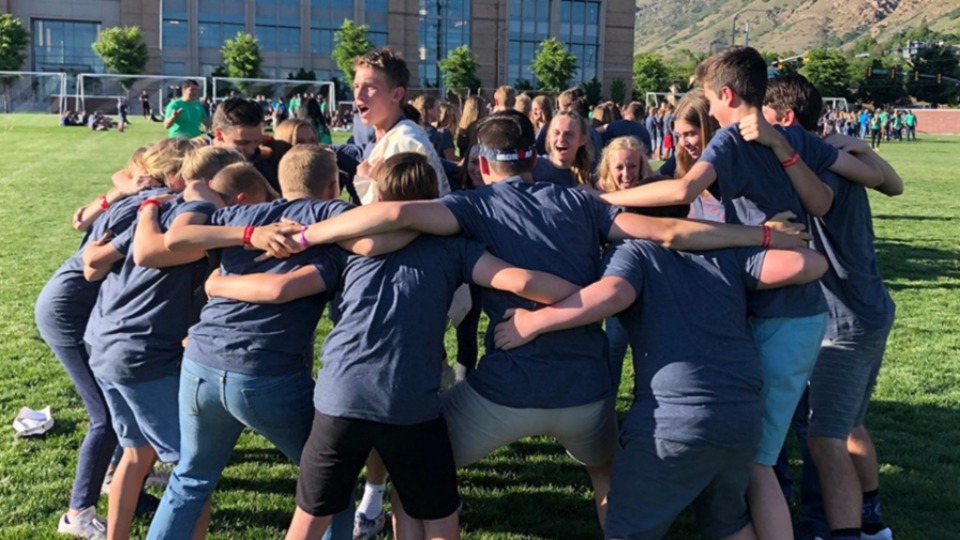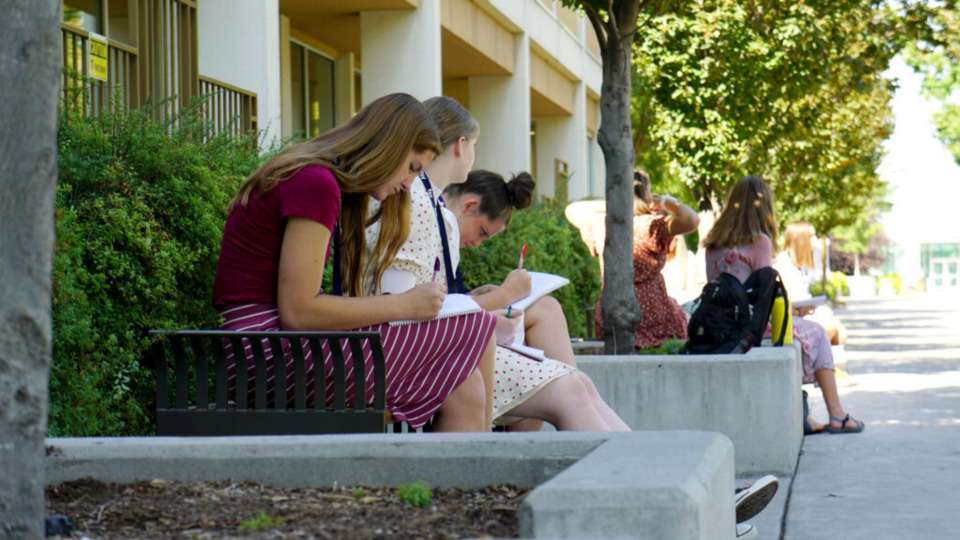| Temple Square is always beautiful in the springtime. Gardeners work to prepare the ground for General Conference. © 2012 Intellectual Reserve, Inc. All rights reserved. | 1 / 2 |
In its first full year in the United States and Canada, For the Strength of Youth conferences are still unfamiliar to many youth, their parents and their leaders. Many youth outside of the U.S. and Canada have had opportunities for many years to participate in FSY conferences.
In a recent Church News podcast interview, Young Men General President Steven J. Lund and Sister Rebecca L. Craven, Second Counselor in the Young Women General Presidency, shared six things youth can get out of their time at FSY.
1. Feel and Recognize the Influence of the Holy Ghost
President Lund said FSY “is a place where kids can come out of the world for five days and come under the influence of the Spirit.”
Being in an environment replete with the influence of the Holy Ghost helps the youth to “make commitments and make decisions and discover a little bit of who they are and what their place is in the Kingdom of God and as a result, they go away on a much higher plane, better able to deal with the realities of the real world,” he said.
Sister Craven said this environment helps youth because understanding how the Spirit speaks to someone is one of the most frequently asked questions youth ask about. She said youth today recognize the need to identify the voice of the Lord inspiring them to make correct decisions and find answers to their questions. Being at FSY immerses youth in a way they can constantly feel the Spirit and be surrounded by others who feel it, too.
“They’re in a space that they’re surrounded by the Spirit, and they will have opportunities, then, to internalize that and see for themselves what it means to live the covenants that they made at baptism and draw upon that gift of the Holy Ghost,” she said.
2. Create Friendships
Young men and young women of the Church each grow up in unique circumstances. Their families, wards, quorums, classes, schools and teams are all different from one another. That’s one of the reasons why, Sister Craven said, it is important for them to be together for a week as fellow members of the Church.
“When they are together, when they’re gathered together, and they’re bonding with other youth who have made similar covenants that they have made, the Spirit can be felt in a whole variety of ways and activities,” she said.
3. Have Fun
President Lund said that he recently had a young man tell him that he’d never seen the Church and fun coexist together. He said this is one of the purposes of having youth participate in FSY.
One of the goals “is to have activities that are so interactive and engaging, that everybody’s happy they’re there, while at the same time they’re talking about important things and bonding together around important themes that are really transformative in their lives,” he said.

4. Gain Mentors
Recently returned missionaries and other young adults are assigned as counselors to small groups of youth at each FSY. These counselors, having recently been in the Young Men and Young Women programs, can sometimes relate to the youth and share testimonies with them in ways that are distinct to those of parents or others in their lives, Sister Craven said.
“That the short age difference between a 16- or 17-year-old and maybe a 20, or 21 year-old or a little bit older, young single adult really helps the youth connect with them. There’s this cool factor.”
President Lund underscored the fact that these young adult counselors are screened at multiple levels before being selected for their roles.
“These young single adults that are mentoring these kids there are the definition of role model. We’ve chosen them carefully,” he said. “We’ve prayed these young people into place and you walk around and see them and they just radiate goodness.”
5. Create Spiritual Momentum
For some who attend FSY, arriving is the hard part. For others, going home can be just as difficult. President Lund and Sister Craven shared ways parents and leaders can help youth once they return from their time at FSY.
“I first hope that the parents will ask them what their experience was and not just throw them back into their chores and everything else that they have to do,” she said. “I think there’s a tendency to have the children come home, or these youth come home, and just not acknowledged the life-changing experience that they had.”

FSY
A group of young women study outside at a For the Strength of Youth conference at Brigham Young University on August 12, 2021. Photo by Jon Ryan Jensen, courtesy of Church News.Copyright 2022 Deseret News Publishing Company.She also encouraged leaders to engage the youth before they leave for FSY by organizing pre-activities that are modeled for stake and ward leaders the year their units are eligible to attend FSY. Likewise, she said, there are also post-FSY activities they can organize to help youth take what they learned and implement it into their quorums, classes and families.
President Lund describes youth who return from FSY as being “somebody different” in that they are better prepared for new spiritual growth.
“Families who send their youth off to these activities can’t really understand or appreciate what’s gone on there and when they come home, they won’t always recognize that somebody different has come around,” he said. “These kids are going to come home ready to continue to progress and move forward together.”
6. Identify as a Child of God
Games, scripture study, dances, devotionals and service activities provide experiences for the youth, but understanding their true nature as children of Heavenly Father is the most significant thing young women and young men can return home with, President Lund said.
“The leading thing that we hope they’ll get out of this is a better awareness of their place in the Kingdom of God, that there’s a God in Heaven who loves them and this is a place where they can come to know that.”
That knowledge is a springboard to further righteous decisions and actions for the youth, Sister Craven explained.
“When they start to really internalize who they are, they also treat other people, as sons and daughters of a Heavenly Father, as well, of Heavenly Parents and it breaks down all kinds of barriers, as they see each other as brothers and sisters and they realize that they have this great responsibility to help gather everybody together.”
President Lund said FSY can be a place where youth begin to see that the words they repeat when they say or read their respective themes aren’t mere poems or affirmations. They are doctrinally true.
“We have a young men’s Aaronic Priesthood quorum theme and there’s a Young Women’s theme and at FSY, they teach to that theme, and these young people learn that this isn’t a poem that we recite when we get together,” he said.
“This is truth, that this is foundational truth. ‘I am a beloved Son of God.’ ‘I am a beloved daughter of Heavenly Parents.’ That’s not an aria. That’s truth — hardened and fast truth and they can learn it in this place by coming under the influence of the Spirit for this period of time.”


